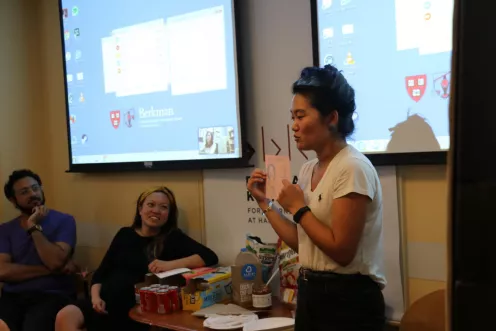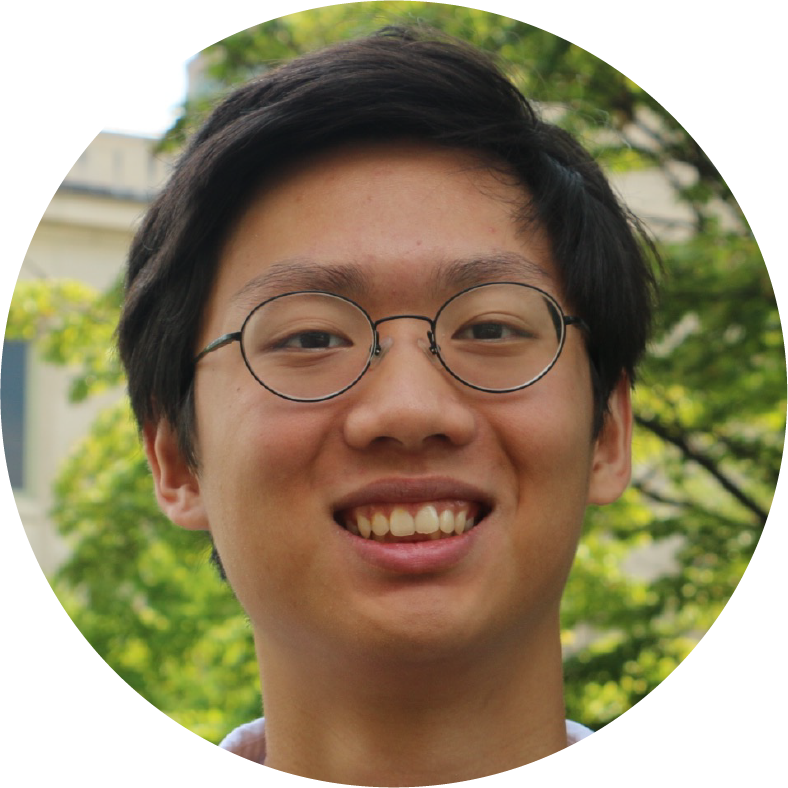
Get to Know Berkman Klein Fellow Rachel Han
a spotlight on one of our 2018-2019 BKC Fellows
 by Tim Koay
by Tim Koay
This interview is part of a collaborative effort between the summer 2018 BKC interns and the Communications team to showcase the tremendous work and backgrounds of our 2018 -'19 BKC fellows
Rachel Han is a 2018-2019 Berkman Klein fellow and Director of Business Development at OpenDataSoft, where she focuses on IoT and smart cities initiatives as well as collaborating with government on data and performance management. Rachel previously served as a consultant to the U.S. Department of the Treasury and Executive Office of the President. She is currently interested in tackling issues related to private-public partnerships in data and digital services in the public sphere.
Read more stories from our Interns and Fellows!
I’m interested in exploring how local governments deliver public services while addressing the safety and privacy of the community that these governments serve.
In your project proposal, you state that you want to work on issues related to IoT data and local governments. Could you elaborate a bit on that?
Local governments will increasingly use data collected from hardware and software tools to improve public service delivery.
Take mobility data, for example. Sensors on public and private transportation networks and sensors on streetlights and intersections can track pedestrian and vehicle count. Sensors on buildings are able to predictively detect a water leak or ways to improve energy usage. These type of hardware and software technology tools have the potential to improve not only our quality of life and environmental sustainability but also provide economic growth opportunities for businesses, e.g. insurance, real estate, and finance to name a few. Meanwhile, there is discussion within state legislatures and city halls on data protection, specifically how Internet users can have more control over what’s collected and shared about them. These discussions will most definitely influence the collection of data from public spaces (data from IoT devices goes through the cloud): how will data be used, where does it go, and what will happen as technology tools change faster than norms and policies are set?
I’m interested in exploring how local governments deliver public services while addressing the safety and privacy of the community that these governments serve. Meanwhile, we, the general public, demand public service, for example a drivers license renewal process, to be as easy as ordering food with our phone. There are various pressure points. It’s an age-old concoction of resource allocation, individual privacy, and public safety challenges, except new technology adds yet another layer of complexity.
Having worked in both government and industry, what do you think are some points of tension with regards to the proliferation of IoT sensors in the public sphere and usage of public data.
I’ll continue to use the same mobility example to describe a possible point of contention: data monetization. The question is, how are costs and benefits of new data sources to be shared among individuals and organized entities?
Historically, many states sell DMV records to insurance and market research companies, and both public and private sector entities benefit, as do individuals. Companies like LexisNexis build individual risk profiles for an insurance policy using a number of variables, from DMV records (if available) to consumer credit ratings, age, gender, ZIP Code, and other information. For states, the revenue helps reduce cost of service operations, for example, shifting government services online. Individual drivers are rewarded for good behavior via lower insurance premiums. The costs and benefits are shared.
Now, as cars have become moving hardware and software parts connected to the cloud, auto companies are incentivizing drivers to share driving data with auto insurers in return for gas money or other rewards. More data means more accurate profiles. What about behavior of people who use one or multiple modals for mobility? Within the US, urban and suburban population growth is head-to-head. Elsewhere, population in cities has or will outpace suburban communities. Many organizations will want access to data on movement, whether it’s cellphone location tracking or IoT devices to beef up their algorithms.
IoT sensors in public spaces have already been installed in numerous US cities. They capture data on movement, including live video feeds. If done right, like DMV records, local governments can improve service quality and lower cost while providing highly valuable information and respect individuals’ right to privacy and data control. Norms and policies take time and will need to meet both the speed in which technology and consumer demand evolve.
What about points of incentive alignment and potential integration?
The good news is that there are areas of agreement when it comes to sharing public data. The open data movement at the local government level in the last decade is a good example. We as a society agree that many datasets are important to share, where the benefit is enormous. The US Census, police records, water quality, and so forth are great examples. Continuing with the example of mobility data and pedestrians, this information, when aggregated, is quite useful for the general public, local governments, and businesses. The individual could be more selective in when and where to avoid crowds. Local businesses can use this information to determine how to optimize operations, e.g. the number of waiters for a shift, electricity usage management, and greater accuracy in property value. Local governments can improve city planning and city-owned or managed land.
There is also wide recognition for when we as a society need to have difficult conversations. I was ten when Dolly, the first mammal cloned from an adult cell, was born. Even as a child, I felt this sense of intense urgency, as people of different backgrounds discussed Dolly and more broadly, the ethical dimensions inherent in scientific research, technology and society. I believe the same is true now, with recent developments in hardware, software, and the supply chain of data and algorithms.
The mission of ethics and law is to explore how to structure life in a community and to ensure that this community thrives. Ethics can help a community investigate questions of morality, values, and group interaction. Law helps codify and enforce these questions and the answers.
Why Berkman Klein and what do you hope to get out of the experience?
With my work, I come across many practitioners — private industry professionals in the IoT space as well as local government officials. However, I don’t interact with people beyond these fields, especially experts in philosophy, sociology, or law. Having access to a community of people with various training, particularly in fields with which I’m less familiar, would be extremely helpful.
Sociologists have researched the emergence of technology and its implications for our society. The mission of ethics and law is to explore how to structure life in a community and to ensure that this community thrives. Ethics can help a community investigate questions of morality, values, and group interaction. Law helps codify and enforce these questions and the answers. We develop, as the world changes. Insights from philosophers and lawyers will help industry and government professionals reflect on our work experiences and develop a playbook, of sorts, to address challenges at work. We all play a small role, with the choices we make individually and in our tribes.
In college, I became quite interested in bioethics at UPenn and went on to work in US/national and global health for a decade. I’m excited to explore Berkman Klein Center’s relatively new focus on ethics and technology. I look forward to meeting experts who have been thinking and experimenting with norms and policies around IoT devices and software, and more broadly, privacy and the Internet.
What are some of your favorite books, blogs, podcasts, or newsletters?
One of my favorite books is Ways of Seeing by John Berger. Half of this short book is text, and the other half is prints of various media. It's part art history and part sociology. The book starts with, “The relation between what we see and what we know is never settled.” I reread this book about once a year. Our individual and collective memory are shaped by the narratives that we build, to describe what we see. This last decade, the speed of seeing and experiencing the world has sped up dramatically; I find it all quite challenging and fascinating.
I also enjoy NPR's Planet Money. I appreciate how the podcast makes economics come alive in people’s everyday life. I especially enjoy stories of when our humanity — our irrationality and emotions — drive economists crazy.
Read more about our Open 2019 - '20 Fellows Call for applications!
Interviewer
Tim Koay
Tim Koay is a former Berktern who worked on the Ethics and Governance of AI and Digital Media and Communications projects for the summer of 2018.
